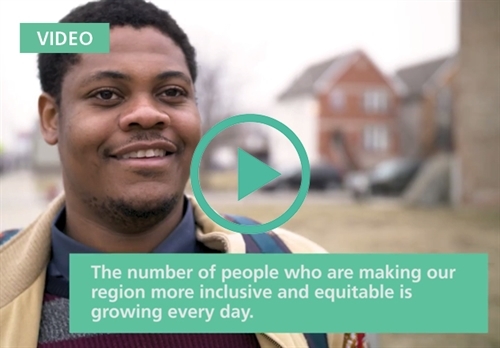
Andre Campbell's life changed for the better when he joined Cleanslate, a social enterprise that provides paid transitional jobs to at-risk Chicagoans.
This profile is part of a series that highlights the work of government, business and community leaders in creating a more equitable and inclusive Chicago region. Each of these stories is featured in "Our Equitable Future"—two dozen recommendations to advance equity MPC released in response to the 2017 Cost of Segregation findings.
Drugs and gun violence have long plagued communities across Chicago, and West Side neighborhoods like Garfield Park and Austin have been the hardest hit by the spike in shootings.
Andre Campbell, a 20-year-old native of Austin, knows this narrative all too well. It was a road that he saw himself going down. “You see drug dealers and gangbangers where I’m from,” Campbell says. “That influenced me to get a job because I didn’t want to fall victim to the streets myself.”
In 2017, Campbell learned about Cleanslate, a social enterprise that provides paid transitional jobs to at-risk Chicagoans. It’s changed his life.
“I have a struggling family. We’re constantly trying to make ends meet,” he says. “Before this, I had nothing.”
Cleanslate is part of Cara, a nonprofit agency dedicated to strengthening communities. Since 1991, Cara has helped people affected by homelessness and poverty get back to work. Because securing a job is only the first step at finding real success and stability, Cara focuses on job retention and building the life skills of its participants.
“When people are blocking and tackling the challenges of poverty, they’re often times blocking and tackling all kinds of other stuff as well,” says Maria Kim, the President and CEO of Cara. “Whatever their challenges, there are lots of them. So it’s not just about the job, it’s about the whole person.”
Kim adds that while Cleanslate participants clean streets, the importance of their work goes beyond their daily tasks: They’re ambassadors for the communities in which they live and serve. For Campbell, the program has been a pathway to secure a full-time job in Environmental Services at Lurie Children’s Hospital, and he can now afford a place for him and his mom to live.
“What Cleanslate has meant to me is a better life and an opportunity to better myself,” he says.
Explore more of the stories in this series.
Who's advancing equity in the Chicago region right now?
This 5-minute video highlights some government, community and business leaders who are already taking action to make our region more equitable and inclusive every day.

MPC thanks CIBC US for generously sponsoring this video.
